- Bernard Preston homepage
- Carbs in the life of a Believer
- Potatoes in the Life of the Believer
Potatoes in the life of the believer
Potatoes in the life of the believer are a precious source of energy but how they are prepared is of critical importance; and grown too.
Good morning and welcome to our second day of discussing the place of carbs in the life of a Christian. That may sound like a very strange subject coming from a church, so I’ll start with a little anecdote.
Twenty years ago I weighed 10kg more than I do now. My blood pressure was too high and I was regularly having severe episodes of back pain. Studying the nature of starches became a consuming interest and is part of the reason that now in our mid-seventies, neither the good wife nor I take any medication.
Yesterday my GP took my blood pressure; 120/83. It doesn't get better than that. It started dropping I think when I began to understand and formulate these principles around potatoes in the life of the Believer.
It’s all about taking good care of the temple where Almighty God dwells. The lower back still troubles but only occasionally these days; a disciplined daily set of exercises also contributes to a my healthy, largely pain-free spine.
 Potatoes in flower.
Potatoes in flower.Chill your cooked potatoes overnight
Firstly alas we start once again with a little science. Starches consist of long chains of sugar molecules. When digested, beginning with thorough chewing in the mouth and then in the small intestine they form glucose which is absorbed into the blood and fed to the liver for processing. Too much of a good thing and you end up with diabetes.
Or are starches a bad thing? Some would have you believe that and they should be avoided entirely; no bread, potatoes or butternut. The devil is in the detail.
After cooking starches if you then cool them overnight, bonds form between these long chains of glucose molecules, damping the rate at which the enzymes are able to digest them; the sugars are released more slowly causing less of a surge and some pass right through to the colon.
It’s called retrogradation. So if you are overweight or prediabetic then chill your carbs before enjoying them; it lowers the glycemic index. If you are planning on a potato salad for the Sunday lunch, boil the spuds the night before and refrigerate them.
You can reheat them in the morning; those links remain intact.
Potatoes and the diabetic Believer
And now for another anecdote, one that made me sit up and take note. Some years back a man who was seriously diabetic told me that he could eat new potatoes with little affect on his blood sugar. But those from cold storage meant he needed an extra squirt of insulin.
He was right. New potatoes have about a third less starch; you should be able to scrape the skin off with your thumbnail. Best of all grow them yourself. Commercially they are sprayed with a very toxic herbicide called Paraquat just before harvesting; it has been scientifically linked to Parkinson's Disease and has been banned in many countries.
Remember that Blue Zone people who live such long and healthy lives grow much of their own food; they wouldn’t be exposed to highly glycemic potatoes from cold storage nor would there be Paraquat residues in their braised spuds.
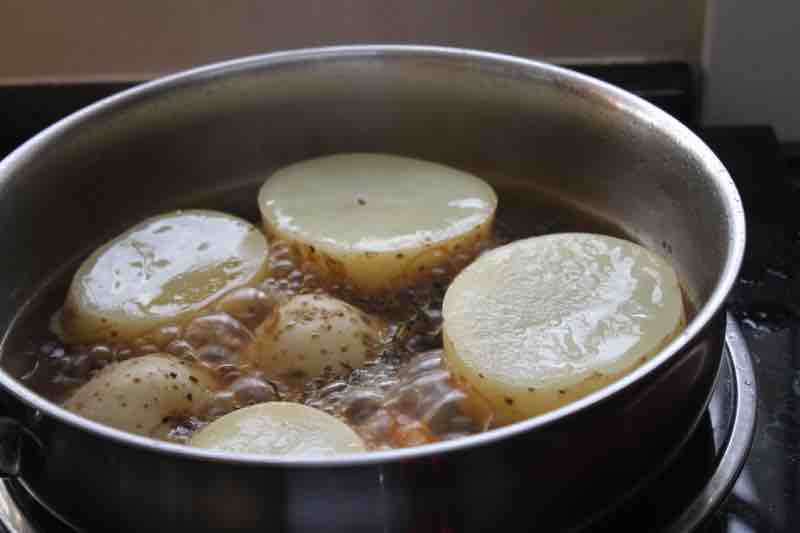 Braised new potatoes.
Braised new potatoes.I recommend you keep your craving for "slap chips" for the odd visit to the beach. They have a very high glycemic index, close to that of sugar; and deep frying in seed oils is inflammatory.
Better still enjoy braised new potatoes cooked in coconut oil; and a little butter.
Then adding fat and protein to your mashed potato further lowers the GI. Gravy, a helping of green beans or a portion of chicken further reduces that likelihood of a blood glucose surge.
Have only one carb at a meal if you are battling with your weight; never potato and pumpkin. And prepare tomorrow’s starch today. Cool it overnight. Do not eat bread straight from the oven, piping hot; delectable but not good for us.
These new potato latkes are a delight and can be enjoyed without guilt; still keep the load down though if you are prediabetic as I am.
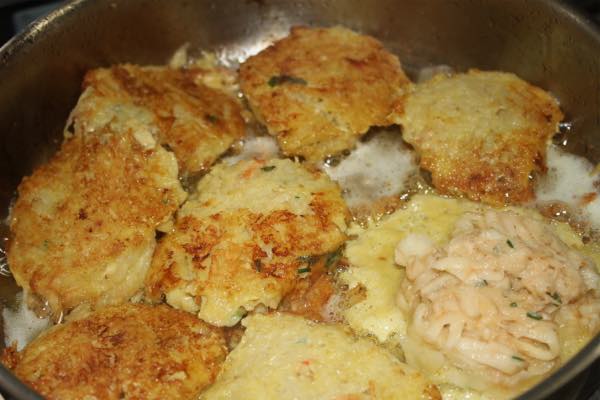 Potato latkes made from new spuds
Potato latkes made from new spudsMagnesium in potatoes
Potatoes incidentally have ten times as much magnesium as most other vegetables. It’s an extremely important mineral; on the commercial diet most of us get less than half the recommended daily allowance. Keep the cooking water and use it for gravies and soups; and oddly in the dough for your artisan bread.
Much of that magnesium is found in and just under the skin; you don't need to peel new potatoes.
There are other complexities which we don’t have time for. To summarise, if you are overweight have only small portions of potato or none at all; and make sure they have been retrograded overnight. Seek out new spuds; more expensive but a lot cheaper than insulin. Better still, grow a little patch yourself if you have a garden.
Take a walk after every starchy meal
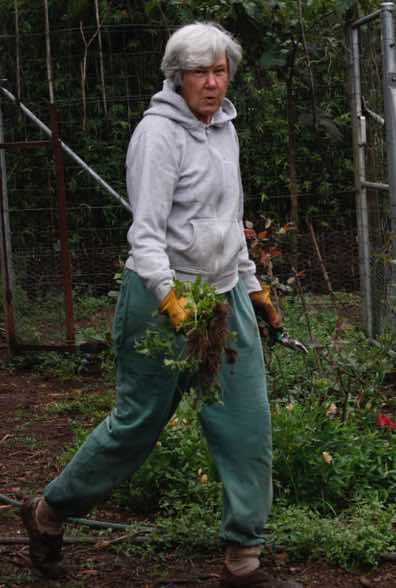 Take a short walk after starchy meals
Take a short walk after starchy mealsAlways after a starchy meal, take a short walk. Much of that potato is turned into glycogen for the muscles instead of glucose that would be stored in the adipose.
In short potatoes are good food but there are important rules to be followed. Nothing is simple when it comes to godly eating; and the Devil certainly has a way of twisting it for the downfall of many.
God bless and have a good day as you ruminate on these matters; may that which is from Him stick. Tomorrow we look at mealies; corn on the cob.
Potatoes in the life of the believer
Potatoes in the life of the believer weighs the ups and downs of this vegetable that is so rich in nutrients.
Wherever possible try to find new potatoes; you may have to grow them yourself. Allow your cooked spuds to retrograde overnight.
This is an impossibly difficult subject; these gems from a weight loss conference held in Germany may open new doors of understanding for you.
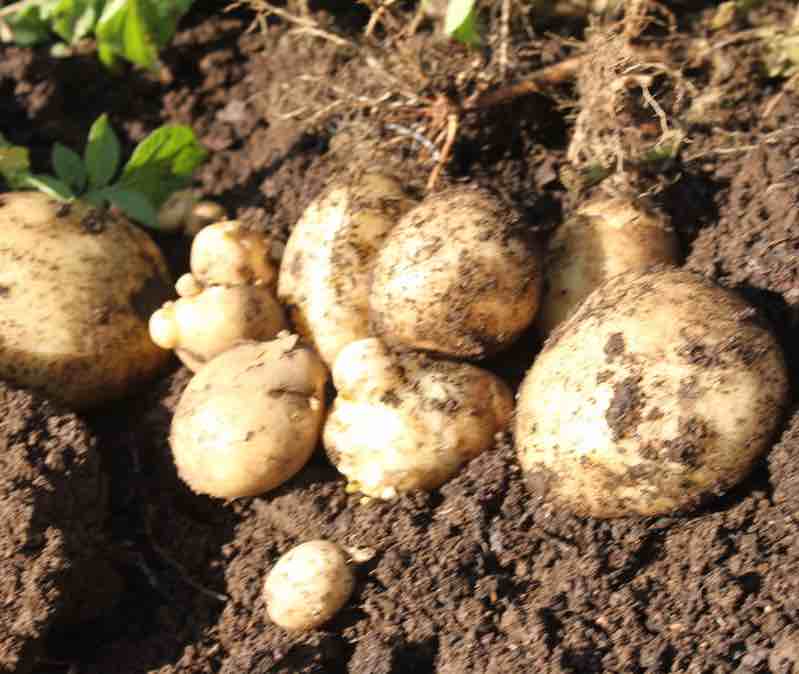 Could you grow potatoes yourself?
Could you grow potatoes yourself?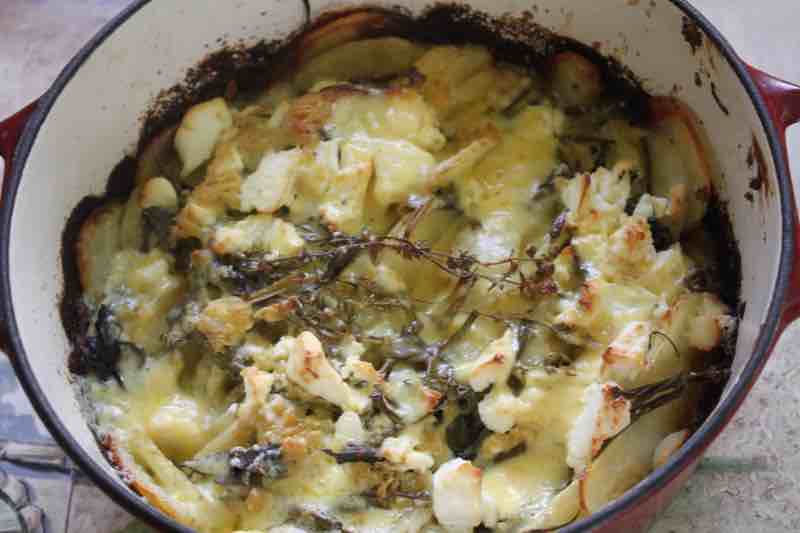
DAy 1: Carbs in the life of a believer
Carbs in the life of a Believer shows how modern milling has taken natural grains and turned them into pseudo foods from the Devil's Pantry.
Day 2: Potatoes in the life of the believer
Part II in this series concerns the place of potatoes in the life of the believer. Gaining some understanding of the meaning of retrogradation helps in the management of obesity.
Day 3: Believers can enjoy green mealies
There is abundant scientific evidence that whole grains are extremely beneficial; they are straight from God's Pantry. But once refined much of the goodness has been extracted and they become highly glycemic; they raise our blood glucose alarmingly.
So believers can enjoy green mealies but will have difficulty finding true wholegrain maizemeal for their porridge and putu.
Day 4: How much sugar in the life of a Believer?
In small amounts sugar is probably fine. There is no consensus on what is acceptable. Over 70 tsp per week is almost certainly too much; that's about one cola per day.
Day 5: What about cake flour for believers?
I know this has been a difficult series of talks for you. Such are the inroads that the Devil has made into our thinking and practice that we have not seen through his deception; corn, sugar and now cake flour.
When browsing use right click and "Open Link in New Tab" or you may get a bad gateway signal.
Newsletter
Our newsletter is entitled "create a cyan zone" at your home, preserving both yourself and Mother Earth for future generations; and the family too, of course. We promise not to spam you with daily emails promoting various products. You may get an occasional nudge to buy one of my books.
Here are the back issues.
- Lifestyle and ideal body weight
- What are ultra-processed foods?
- Investing in long-term health
- Diseases from plastic exposure
- Intensive lifestyle management for obesity has limited value
- A world largely devoid of Parkinson's Disease
- The impact of friendly bacteria in the tum on the prevention of cancer
- There's a hole in the bucket
- Everyone is talking about weight loss drugs
- Pull the sweet tooth
- If you suffer from heartburn plant a susu
- Refined maize meal and stunting
- Should agriculture and industry get priority for water and electricity?
- Nature is calling
- Mill your own flour
- Bake your own sourdough bread
- Microplastics from our water
- Alternative types of water storage
- Wear your clothes out
- Comfort foods
- Create a bee-friendly environment
- Go to bed slightly hungry
- Keep bees
- Blue zone folk are religious
- Reduce plastic waste
- Family is important
- What can go in compost?
- Grow broad beans for longevity
- Harvest and store sunshine
- Blue zone exercise
- Harvest and store your rainwater
- Create a cyan zone at your home
Did you find this page interesting? How about forwarding it to a friendly book or food junkie? Better still, a social media tick would help.
- Bernard Preston homepage
- Carbs in the life of a Believer
- Potatoes in the Life of the Believer
Address:
56 Groenekloof Rd,
Hilton, KZN
South Africa
Website:
https://www.bernard-preston.com